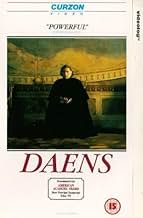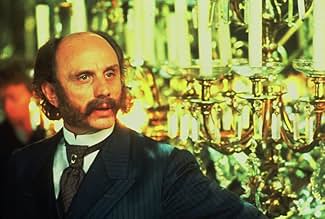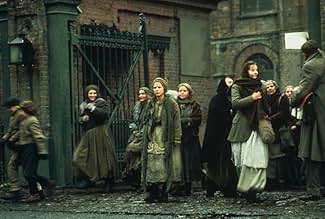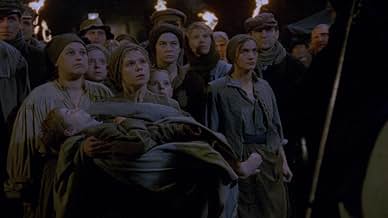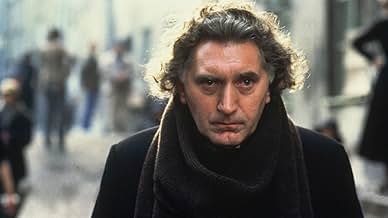Füge eine Handlung in deiner Sprache hinzuIn the 1890s, Father Adolf Daens goes to Aalst, a textile town where child labor is rife, pay and working conditions are horrible, the poor have no vote, and the Catholic church backs the pe... Alles lesenIn the 1890s, Father Adolf Daens goes to Aalst, a textile town where child labor is rife, pay and working conditions are horrible, the poor have no vote, and the Catholic church backs the petite bourgeoisie in oppressing workers. He writes a few columns for the Catholic paper, an... Alles lesenIn the 1890s, Father Adolf Daens goes to Aalst, a textile town where child labor is rife, pay and working conditions are horrible, the poor have no vote, and the Catholic church backs the petite bourgeoisie in oppressing workers. He writes a few columns for the Catholic paper, and soon workers are listening and the powerful are in an uproar. He's expelled from the Cat... Alles lesen
- Für 1 Oscar nominiert
- 10 Gewinne & 4 Nominierungen insgesamt
- Eugene Borremans
- (as Idwig Stephane)
- Elizabeth Borremans
- (as Linda van Dijck)
- Mayor Vanwambeke
- (as Fred van Kuijk)
Empfohlene Bewertungen
Especially heartbreaking and infuriating are the scenes which juxtapose young factory children being overworked, abused and mangled by the textile machines with rich and powerful nobles around their sumptuous dinner tables. The emotional high point of the film, for me, came when Daens gives an impromptu speech in a church, shouting out, "People scream, 'we are hungry!' Loud and clear!" It is difficult not to be emotionally caught by such a scene.
Father Daens ultimately shows in this film what Gandhi told someone: that one's religion is in one's actions, not in one's words, clothes or wealth.
Together with his brother he faced and defeated the rich. He helped the poor people and got them the right to vote. In his quest he the pope and all who were against him eventually took away his rights as a priest.
Daens continued to help the poor, and became the voice of the people in the parliament. He was a good man who stood up for the poor.
The movie itself gives a very good look how people worked their asses of for only a few CENTS.
The film 'Daens' portrays the struggle of a courageous man to spread the gospel of Christ to impoverished and exploited textile workers in late 19th Century Belgium. His main enemies are the 'Godless' socialists who offer his flock a more earthly paradise and also his own Church hierarchy who stand fast with the capitalist class in opposing all attempts at social reform. Daens follows the dictates of conscience, founds his own Catholic People's Party and becomes a charismatic leader of the Flemish-speaking poor whose interests are largely ignored by the French-speaking Christian Democrats. This official Church-backed Catholic Party is dominated by capitalists who see religion as a means of social control and property-protection.
The scene is set for conflicts of conscience, class and language. How should the Church respond to the new evils of capitalism? Daens, of course, is only trying to follow the spirit of the Holy Father's encyclical 'Rerum Novarum' (1891) which endorsed state regulation to curb the worst abuses of industrialism. Complaints from the Belgian hierarchy result in Daens being summoned to Rome to explain himself. He never gets to meet the Pope and is eventually excommunicated for his disobedience to his local hierarchy.
Echoes here of 'Liberation theology' and Pope John Paul II publicly rebuking a Sandinista priest in Nicaragua for his political activities. Echoes also of Martin Luther's stand against different abuses 400 years earlier.
There is a great deal going on in this film and its subject matter is difficult and obscure. Nevertheless 'Daens' successfully portrays the man and his milieu in an entertaining way. The film held my interest throughout and it spurred me to research the topic further. Its depiction of living and working conditions is exemplary and the industrial accident scene is harrowing. The subplot focusing on a working girl's attraction to both the Church and to a young socialist radical encapsulates the wider struggle being played out on the political stage.
The inferior position of Flemish in Belgian society at that time is shown by the mainly Flemish dialogue used between Daens and his flock and the mainly French dialogue used between Daens and his Church and social superiors and within the Belgian parliament. The parliamentary Commission of Enquiry into working conditions is unable to question the Aalst workers properly because of this language barrier.
Sexual harassment of women in the workplace which used to be so commonplace is shown by a particularly strong rape scene.The fact that the perpetrator is a factory foreman underlines both 'capitalist lackey' and 'corruption of power' themes.
The film gives some insight into the tremendous hostility which developed between the European Left and the Catholic Church from the French Revolution onwards. The Church under the recently sanctified Pius IX (1846-1878) turned its back on everything modern. The Left turned its back on a Christian religion whose main institution resisted all the new ideas thrown up by tremendous social change. These are the big themes against which the Daens drama is acted out.
And acted out well it certainly is. Jan Decleir gives a powerful performance as the eponymous hero. The reverence of simple Catholic workers for their Church, their suspicion of socialism but desire for better conditions together provide the springboard for the short-lived Daens success story. This complex social dynamic is beautifully depicted in intimate scenes in which individual relationships are used to explain the wider picture. The film is always in danger of collapsing under the weight of the historical events it depicts. This never quite happens and it is hard to envisage a better screenplay for a film of this length and difficulty of subject.
The Daens theme is with us still. Archbishop Romero was killed by right-wing gunmen for supporting the poor. The Catholic archbishop of Recife in Brazil famously said,
"When I say, 'Feed the poor' they call me a saint. When I ask, 'Why are they poor?' they call me a Communist."
Having consigned Communism to the dustbin of History (at least temporarily?), Pope John Paul II spent his last years railing against capitalist materialism and economic inequality. In my opinion, Catholics will only solve this dilemma when they are able to reconcile Scripture with the Enlightenment and absorb Marxist and other secularist critiques of global capitalism into their faith. Unfortunately their Church over the last two centuries has usually backed the powerful against the weak, the rich against the poor. Daens is an example of thousands of individual Catholics world-wide who have taken simple Christian teachings at their face value to follow their own conscience. Equally, there is no compelling reason for the Left to maintain its historic antipathy towards religion. Christianity and Socialism are natural bedfellows.
For a non-Belgian audience with a poor knowledge of history 'Daens' could be a difficult film to enjoy. I hope that this review will help more people to access it and understand the powerful light it throws on much wider religious and political issues. A Daens website in Belgium shows that this man still has his local fans but it would be too much to expect the Church to lift its ban of excommunication, let alone consider him as a candidate for beatification. The Church has recently apologised for the way it treated Galileo, so who knows? That is entirely a matter for the Church but I would urge anyone interested in religion, history and politics to watch this film. I eagerly await its DVD format.
"Daens" is a socially motivated film. One is inclined to compare it with the English kitchen sink movement, but that would not be entirely justified. Kitchen sink films are about laborers in the mid 20th centry, "Daens is situated at the end of the 19th century. With "Marina" (2013) director Stijn Coninx would later make a movie that is more in line with English kitchen sink.
A better comparison is with "How green was my valley" (1941, John Ford). Both films are situated in the same time frame and in both films there is an enlighted priest. "How green was my valley" contains however far more human interest and is far less openly political. The film "Daens" takes itself very seriously, but it must be said that the shocking working conditions leave very little room for humor. Only in the end, in the scene in which Jefke died, there was a poetic moment involving a circus. A moment that seems to be directly derived from a Bergman movie.
Serious or not, "Daens" is a very beautifully made film. The set pieces are very convincing. It was not by accident that "Daens" was nominaed for an Oscar for best foreign language movie. The Oscar was however won by "Indochine" (1992, Regis Wargnier). Five years later lead actor Jan Decleir played in the Dutch movie "Character" (1997, Mike van Diem) and this move did win the Oscar for best foreign langauge movie.
Wusstest du schon
- WissenswertesFilm debut of Matthias Schoenaerts.
- Alternative VersionenThere is a version spanning a total of 196 minutes. Mostly shown as a four part mini-series.
- VerbindungenFeatured in Zomergasten: Folge #8.1 (1995)
Top-Auswahl
- How long is Daens?Powered by Alexa
Details
- Erscheinungsdatum
- Herkunftsländer
- Sprachen
- Auch bekannt als
- Priest Daens
- Drehorte
- Produktionsfirmen
- Weitere beteiligte Unternehmen bei IMDbPro anzeigen

